Palliative Care: Ethical Decision-Making and Cultural Considerations
VerifiedAdded on 2022/09/13
|7
|1859
|7
Essay
AI Summary
This essay discusses the ethical decision-making principles relevant to providing palliative care for Mr. John, an Aboriginal patient. It addresses the importance of autonomy, beneficence, and justice in healthcare decisions, emphasizing the need to respect Mr. John's wishes regarding end-of-life care at home. The essay also explores the significant impact of Aboriginal culture and traditions on palliative care, including the role of family and community elders in decision-making and traditional healing practices. It reflects on how personal beliefs might influence the care provided and strategies to manage these influences, such as adhering to ethical principles and practicing culturally sensitive care. The conclusion underscores the importance of informed patient decisions, ethical healthcare practices, cultural respect, and managing personal beliefs in palliative care settings. Desklib provides similar essays and study tools for students.
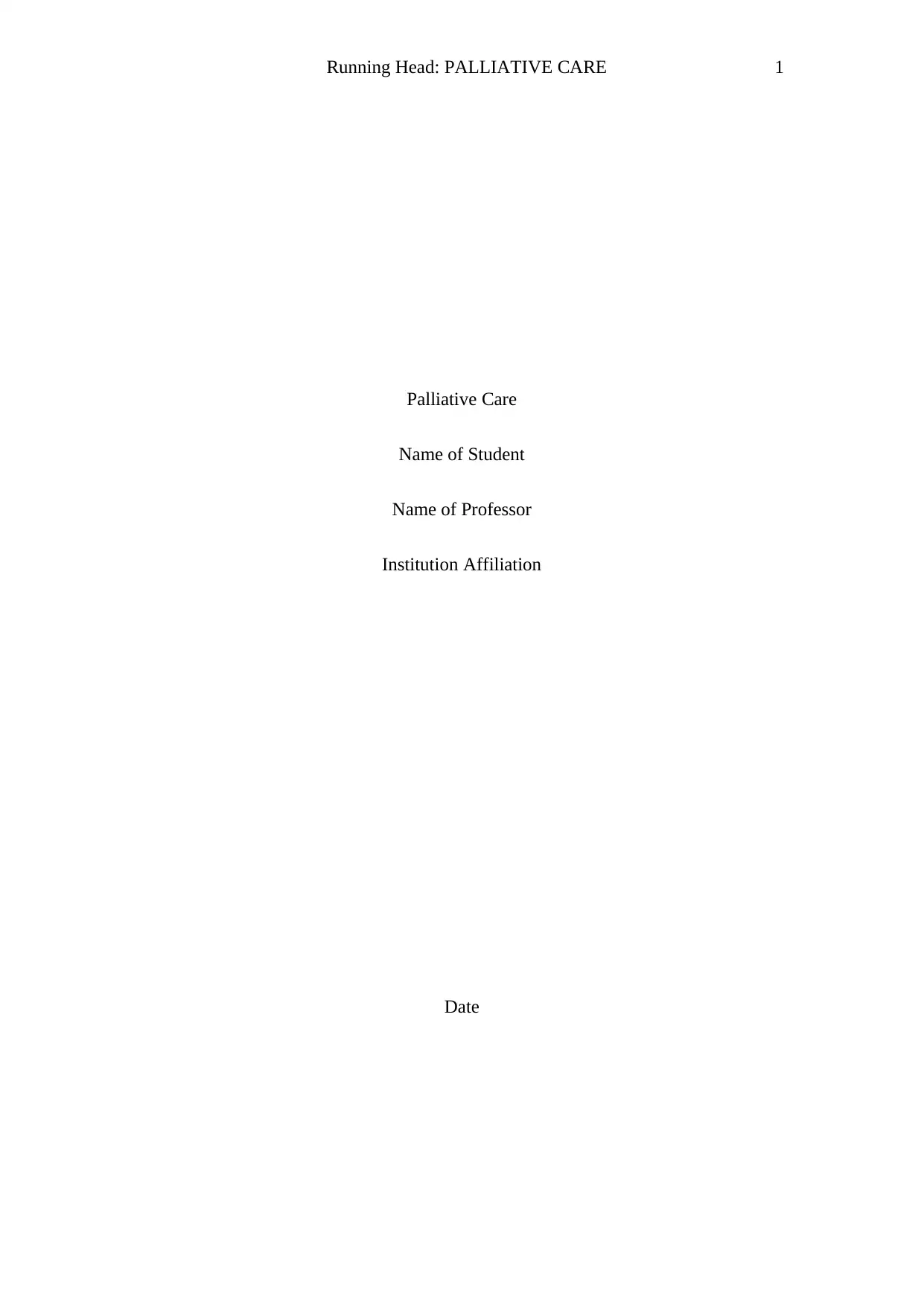
Running Head: PALLIATIVE CARE 1
Palliative Care
Name of Student
Name of Professor
Institution Affiliation
Date
Palliative Care
Name of Student
Name of Professor
Institution Affiliation
Date
Paraphrase This Document
Need a fresh take? Get an instant paraphrase of this document with our AI Paraphraser
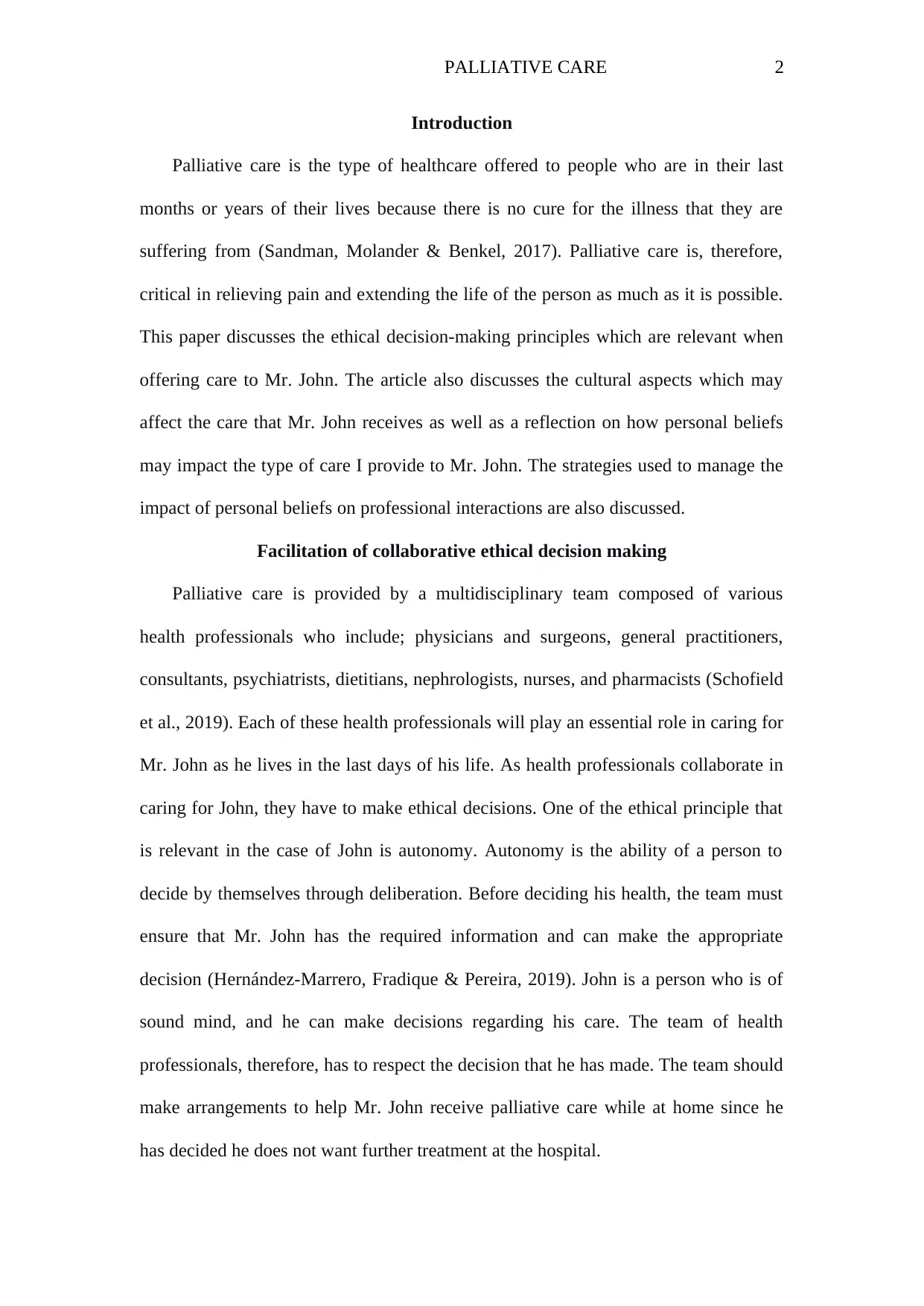
PALLIATIVE CARE 2
Introduction
Palliative care is the type of healthcare offered to people who are in their last
months or years of their lives because there is no cure for the illness that they are
suffering from (Sandman, Molander & Benkel, 2017). Palliative care is, therefore,
critical in relieving pain and extending the life of the person as much as it is possible.
This paper discusses the ethical decision-making principles which are relevant when
offering care to Mr. John. The article also discusses the cultural aspects which may
affect the care that Mr. John receives as well as a reflection on how personal beliefs
may impact the type of care I provide to Mr. John. The strategies used to manage the
impact of personal beliefs on professional interactions are also discussed.
Facilitation of collaborative ethical decision making
Palliative care is provided by a multidisciplinary team composed of various
health professionals who include; physicians and surgeons, general practitioners,
consultants, psychiatrists, dietitians, nephrologists, nurses, and pharmacists (Schofield
et al., 2019). Each of these health professionals will play an essential role in caring for
Mr. John as he lives in the last days of his life. As health professionals collaborate in
caring for John, they have to make ethical decisions. One of the ethical principle that
is relevant in the case of John is autonomy. Autonomy is the ability of a person to
decide by themselves through deliberation. Before deciding his health, the team must
ensure that Mr. John has the required information and can make the appropriate
decision (Hernández-Marrero, Fradique & Pereira, 2019). John is a person who is of
sound mind, and he can make decisions regarding his care. The team of health
professionals, therefore, has to respect the decision that he has made. The team should
make arrangements to help Mr. John receive palliative care while at home since he
has decided he does not want further treatment at the hospital.
Introduction
Palliative care is the type of healthcare offered to people who are in their last
months or years of their lives because there is no cure for the illness that they are
suffering from (Sandman, Molander & Benkel, 2017). Palliative care is, therefore,
critical in relieving pain and extending the life of the person as much as it is possible.
This paper discusses the ethical decision-making principles which are relevant when
offering care to Mr. John. The article also discusses the cultural aspects which may
affect the care that Mr. John receives as well as a reflection on how personal beliefs
may impact the type of care I provide to Mr. John. The strategies used to manage the
impact of personal beliefs on professional interactions are also discussed.
Facilitation of collaborative ethical decision making
Palliative care is provided by a multidisciplinary team composed of various
health professionals who include; physicians and surgeons, general practitioners,
consultants, psychiatrists, dietitians, nephrologists, nurses, and pharmacists (Schofield
et al., 2019). Each of these health professionals will play an essential role in caring for
Mr. John as he lives in the last days of his life. As health professionals collaborate in
caring for John, they have to make ethical decisions. One of the ethical principle that
is relevant in the case of John is autonomy. Autonomy is the ability of a person to
decide by themselves through deliberation. Before deciding his health, the team must
ensure that Mr. John has the required information and can make the appropriate
decision (Hernández-Marrero, Fradique & Pereira, 2019). John is a person who is of
sound mind, and he can make decisions regarding his care. The team of health
professionals, therefore, has to respect the decision that he has made. The team should
make arrangements to help Mr. John receive palliative care while at home since he
has decided he does not want further treatment at the hospital.
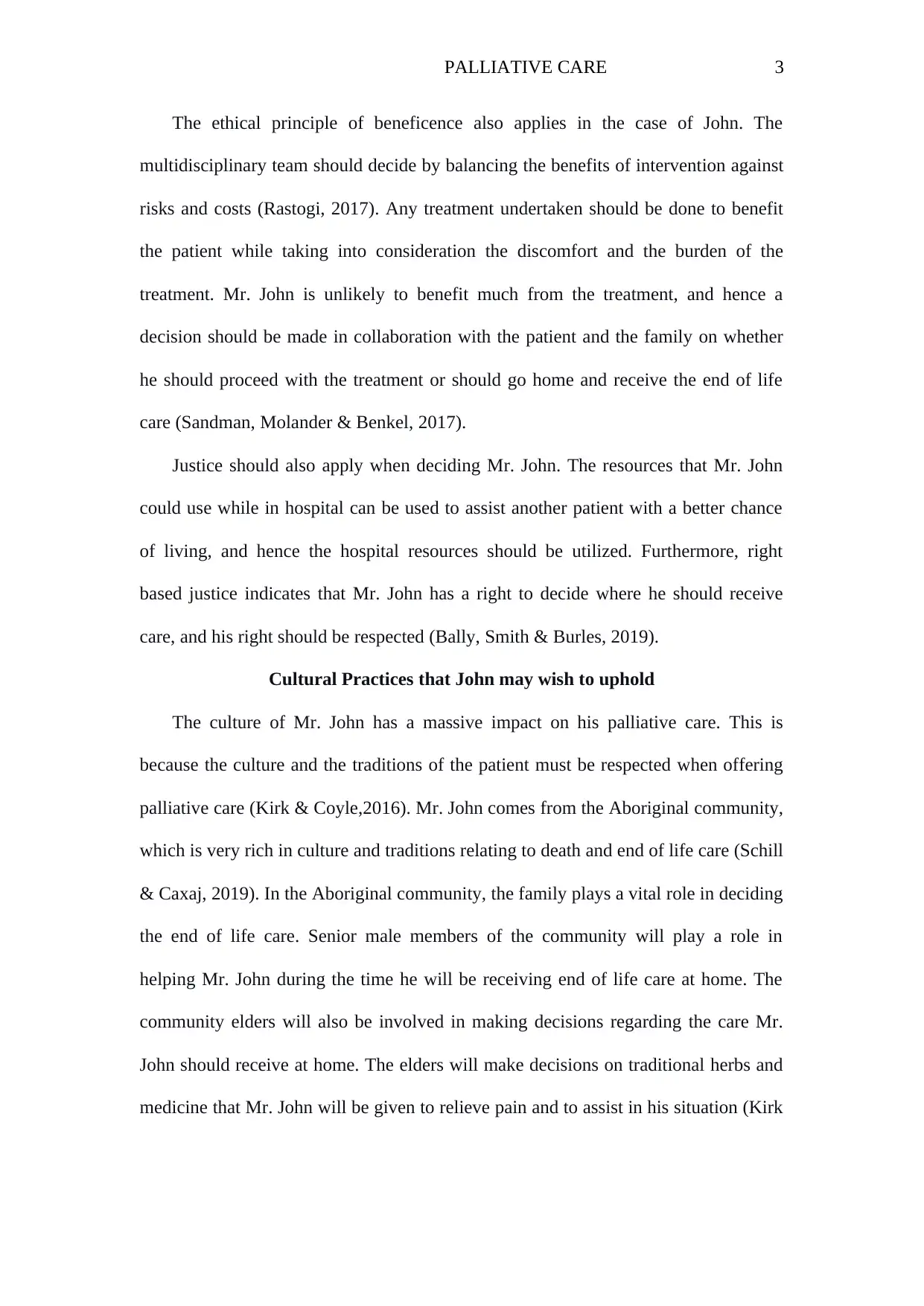
PALLIATIVE CARE 3
The ethical principle of beneficence also applies in the case of John. The
multidisciplinary team should decide by balancing the benefits of intervention against
risks and costs (Rastogi, 2017). Any treatment undertaken should be done to benefit
the patient while taking into consideration the discomfort and the burden of the
treatment. Mr. John is unlikely to benefit much from the treatment, and hence a
decision should be made in collaboration with the patient and the family on whether
he should proceed with the treatment or should go home and receive the end of life
care (Sandman, Molander & Benkel, 2017).
Justice should also apply when deciding Mr. John. The resources that Mr. John
could use while in hospital can be used to assist another patient with a better chance
of living, and hence the hospital resources should be utilized. Furthermore, right
based justice indicates that Mr. John has a right to decide where he should receive
care, and his right should be respected (Bally, Smith & Burles, 2019).
Cultural Practices that John may wish to uphold
The culture of Mr. John has a massive impact on his palliative care. This is
because the culture and the traditions of the patient must be respected when offering
palliative care (Kirk & Coyle,2016). Mr. John comes from the Aboriginal community,
which is very rich in culture and traditions relating to death and end of life care (Schill
& Caxaj, 2019). In the Aboriginal community, the family plays a vital role in deciding
the end of life care. Senior male members of the community will play a role in
helping Mr. John during the time he will be receiving end of life care at home. The
community elders will also be involved in making decisions regarding the care Mr.
John should receive at home. The elders will make decisions on traditional herbs and
medicine that Mr. John will be given to relieve pain and to assist in his situation (Kirk
The ethical principle of beneficence also applies in the case of John. The
multidisciplinary team should decide by balancing the benefits of intervention against
risks and costs (Rastogi, 2017). Any treatment undertaken should be done to benefit
the patient while taking into consideration the discomfort and the burden of the
treatment. Mr. John is unlikely to benefit much from the treatment, and hence a
decision should be made in collaboration with the patient and the family on whether
he should proceed with the treatment or should go home and receive the end of life
care (Sandman, Molander & Benkel, 2017).
Justice should also apply when deciding Mr. John. The resources that Mr. John
could use while in hospital can be used to assist another patient with a better chance
of living, and hence the hospital resources should be utilized. Furthermore, right
based justice indicates that Mr. John has a right to decide where he should receive
care, and his right should be respected (Bally, Smith & Burles, 2019).
Cultural Practices that John may wish to uphold
The culture of Mr. John has a massive impact on his palliative care. This is
because the culture and the traditions of the patient must be respected when offering
palliative care (Kirk & Coyle,2016). Mr. John comes from the Aboriginal community,
which is very rich in culture and traditions relating to death and end of life care (Schill
& Caxaj, 2019). In the Aboriginal community, the family plays a vital role in deciding
the end of life care. Senior male members of the community will play a role in
helping Mr. John during the time he will be receiving end of life care at home. The
community elders will also be involved in making decisions regarding the care Mr.
John should receive at home. The elders will make decisions on traditional herbs and
medicine that Mr. John will be given to relieve pain and to assist in his situation (Kirk
⊘ This is a preview!⊘
Do you want full access?
Subscribe today to unlock all pages.

Trusted by 1+ million students worldwide
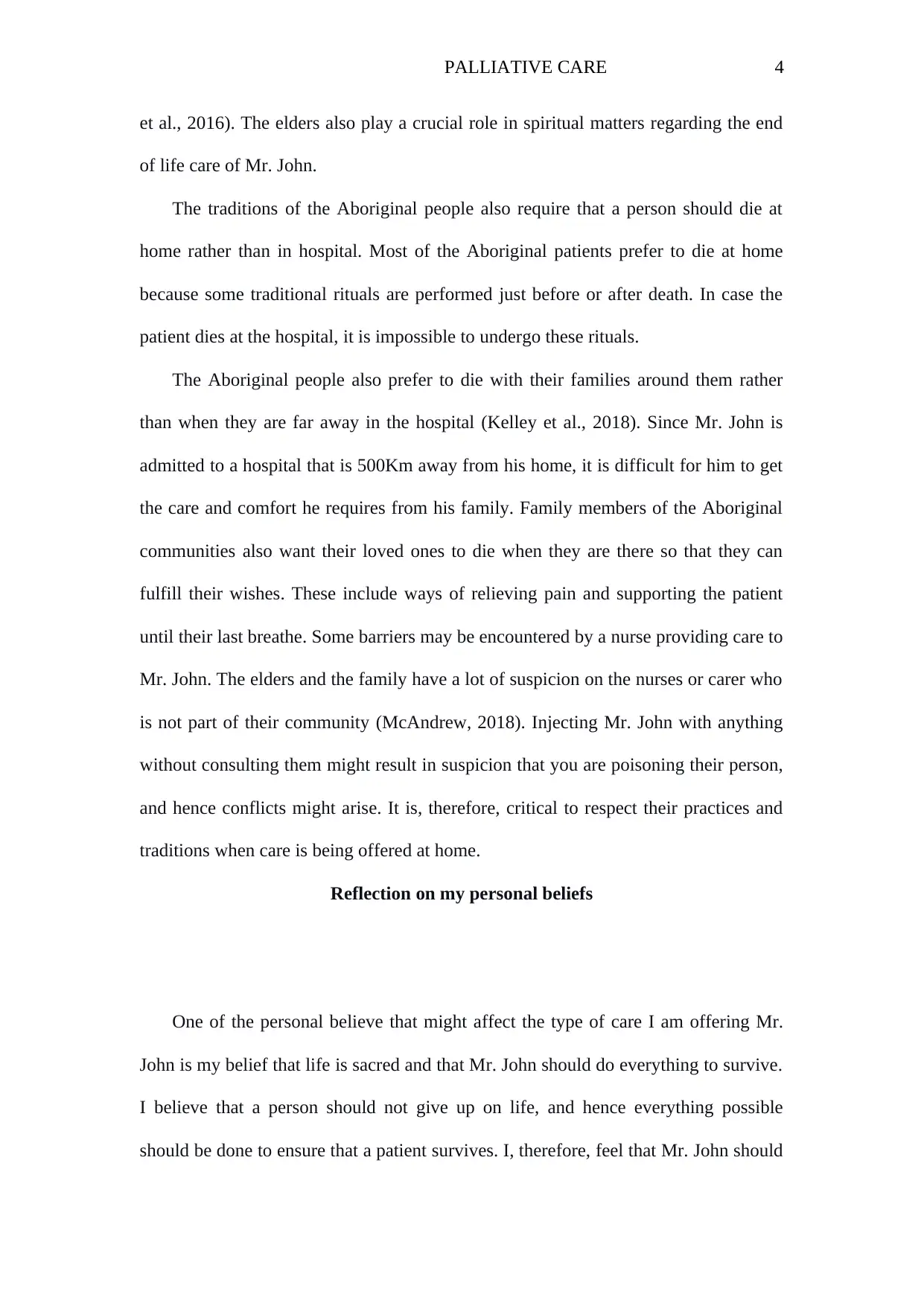
PALLIATIVE CARE 4
et al., 2016). The elders also play a crucial role in spiritual matters regarding the end
of life care of Mr. John.
The traditions of the Aboriginal people also require that a person should die at
home rather than in hospital. Most of the Aboriginal patients prefer to die at home
because some traditional rituals are performed just before or after death. In case the
patient dies at the hospital, it is impossible to undergo these rituals.
The Aboriginal people also prefer to die with their families around them rather
than when they are far away in the hospital (Kelley et al., 2018). Since Mr. John is
admitted to a hospital that is 500Km away from his home, it is difficult for him to get
the care and comfort he requires from his family. Family members of the Aboriginal
communities also want their loved ones to die when they are there so that they can
fulfill their wishes. These include ways of relieving pain and supporting the patient
until their last breathe. Some barriers may be encountered by a nurse providing care to
Mr. John. The elders and the family have a lot of suspicion on the nurses or carer who
is not part of their community (McAndrew, 2018). Injecting Mr. John with anything
without consulting them might result in suspicion that you are poisoning their person,
and hence conflicts might arise. It is, therefore, critical to respect their practices and
traditions when care is being offered at home.
Reflection on my personal beliefs
One of the personal believe that might affect the type of care I am offering Mr.
John is my belief that life is sacred and that Mr. John should do everything to survive.
I believe that a person should not give up on life, and hence everything possible
should be done to ensure that a patient survives. I, therefore, feel that Mr. John should
et al., 2016). The elders also play a crucial role in spiritual matters regarding the end
of life care of Mr. John.
The traditions of the Aboriginal people also require that a person should die at
home rather than in hospital. Most of the Aboriginal patients prefer to die at home
because some traditional rituals are performed just before or after death. In case the
patient dies at the hospital, it is impossible to undergo these rituals.
The Aboriginal people also prefer to die with their families around them rather
than when they are far away in the hospital (Kelley et al., 2018). Since Mr. John is
admitted to a hospital that is 500Km away from his home, it is difficult for him to get
the care and comfort he requires from his family. Family members of the Aboriginal
communities also want their loved ones to die when they are there so that they can
fulfill their wishes. These include ways of relieving pain and supporting the patient
until their last breathe. Some barriers may be encountered by a nurse providing care to
Mr. John. The elders and the family have a lot of suspicion on the nurses or carer who
is not part of their community (McAndrew, 2018). Injecting Mr. John with anything
without consulting them might result in suspicion that you are poisoning their person,
and hence conflicts might arise. It is, therefore, critical to respect their practices and
traditions when care is being offered at home.
Reflection on my personal beliefs
One of the personal believe that might affect the type of care I am offering Mr.
John is my belief that life is sacred and that Mr. John should do everything to survive.
I believe that a person should not give up on life, and hence everything possible
should be done to ensure that a patient survives. I, therefore, feel that Mr. John should
Paraphrase This Document
Need a fresh take? Get an instant paraphrase of this document with our AI Paraphraser
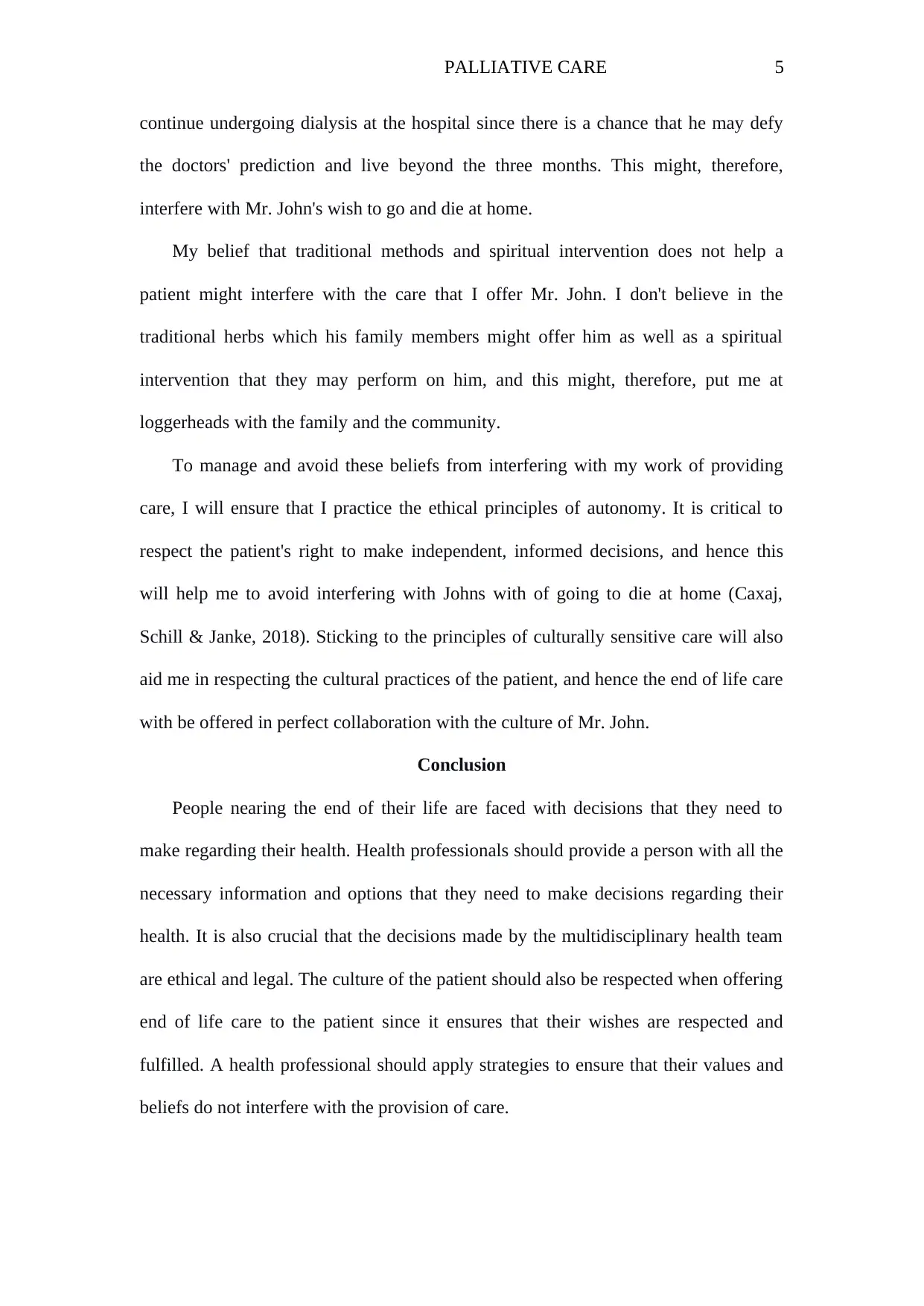
PALLIATIVE CARE 5
continue undergoing dialysis at the hospital since there is a chance that he may defy
the doctors' prediction and live beyond the three months. This might, therefore,
interfere with Mr. John's wish to go and die at home.
My belief that traditional methods and spiritual intervention does not help a
patient might interfere with the care that I offer Mr. John. I don't believe in the
traditional herbs which his family members might offer him as well as a spiritual
intervention that they may perform on him, and this might, therefore, put me at
loggerheads with the family and the community.
To manage and avoid these beliefs from interfering with my work of providing
care, I will ensure that I practice the ethical principles of autonomy. It is critical to
respect the patient's right to make independent, informed decisions, and hence this
will help me to avoid interfering with Johns with of going to die at home (Caxaj,
Schill & Janke, 2018). Sticking to the principles of culturally sensitive care will also
aid me in respecting the cultural practices of the patient, and hence the end of life care
with be offered in perfect collaboration with the culture of Mr. John.
Conclusion
People nearing the end of their life are faced with decisions that they need to
make regarding their health. Health professionals should provide a person with all the
necessary information and options that they need to make decisions regarding their
health. It is also crucial that the decisions made by the multidisciplinary health team
are ethical and legal. The culture of the patient should also be respected when offering
end of life care to the patient since it ensures that their wishes are respected and
fulfilled. A health professional should apply strategies to ensure that their values and
beliefs do not interfere with the provision of care.
continue undergoing dialysis at the hospital since there is a chance that he may defy
the doctors' prediction and live beyond the three months. This might, therefore,
interfere with Mr. John's wish to go and die at home.
My belief that traditional methods and spiritual intervention does not help a
patient might interfere with the care that I offer Mr. John. I don't believe in the
traditional herbs which his family members might offer him as well as a spiritual
intervention that they may perform on him, and this might, therefore, put me at
loggerheads with the family and the community.
To manage and avoid these beliefs from interfering with my work of providing
care, I will ensure that I practice the ethical principles of autonomy. It is critical to
respect the patient's right to make independent, informed decisions, and hence this
will help me to avoid interfering with Johns with of going to die at home (Caxaj,
Schill & Janke, 2018). Sticking to the principles of culturally sensitive care will also
aid me in respecting the cultural practices of the patient, and hence the end of life care
with be offered in perfect collaboration with the culture of Mr. John.
Conclusion
People nearing the end of their life are faced with decisions that they need to
make regarding their health. Health professionals should provide a person with all the
necessary information and options that they need to make decisions regarding their
health. It is also crucial that the decisions made by the multidisciplinary health team
are ethical and legal. The culture of the patient should also be respected when offering
end of life care to the patient since it ensures that their wishes are respected and
fulfilled. A health professional should apply strategies to ensure that their values and
beliefs do not interfere with the provision of care.
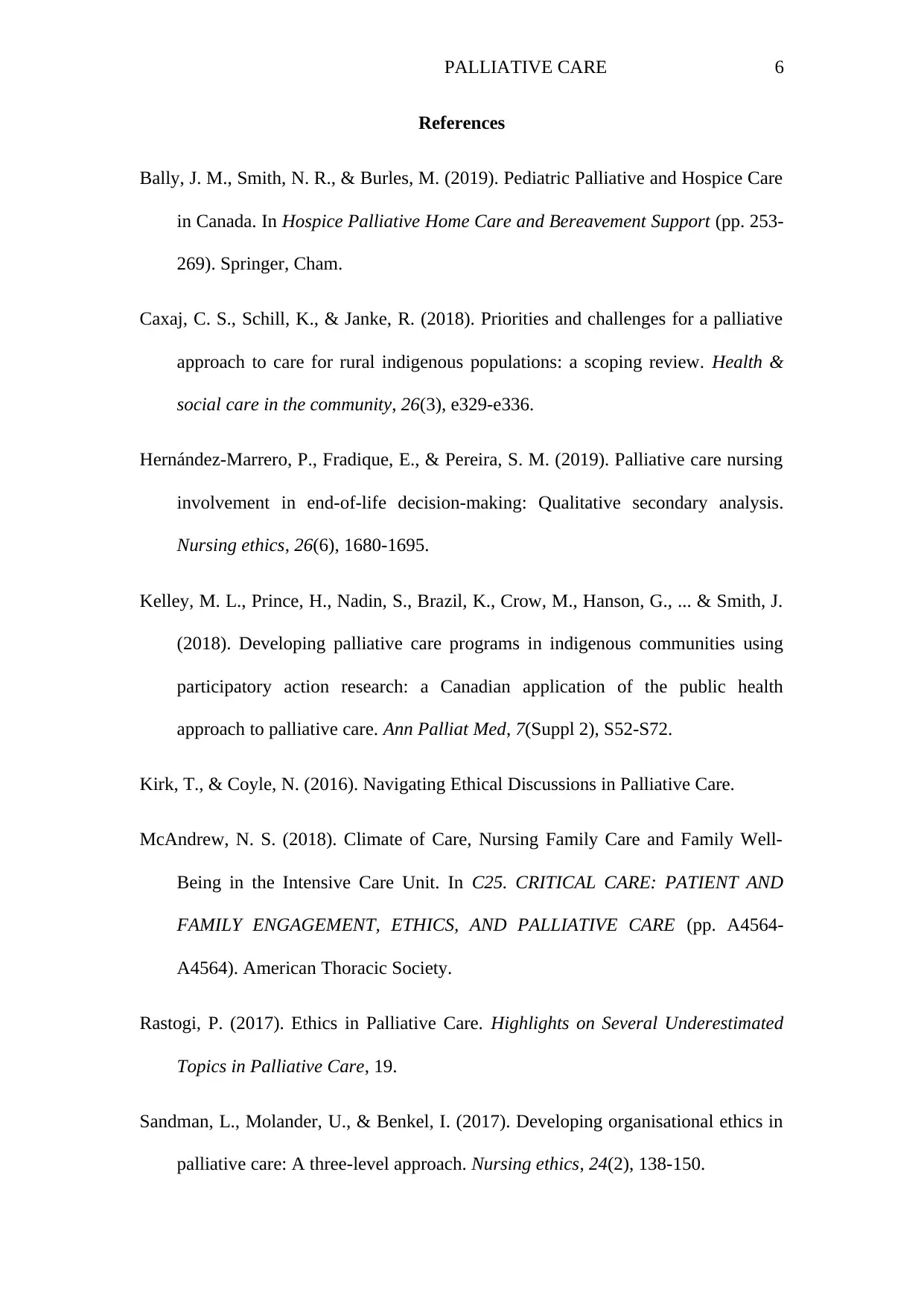
PALLIATIVE CARE 6
References
Bally, J. M., Smith, N. R., & Burles, M. (2019). Pediatric Palliative and Hospice Care
in Canada. In Hospice Palliative Home Care and Bereavement Support (pp. 253-
269). Springer, Cham.
Caxaj, C. S., Schill, K., & Janke, R. (2018). Priorities and challenges for a palliative
approach to care for rural indigenous populations: a scoping review. Health &
social care in the community, 26(3), e329-e336.
Hernández-Marrero, P., Fradique, E., & Pereira, S. M. (2019). Palliative care nursing
involvement in end-of-life decision-making: Qualitative secondary analysis.
Nursing ethics, 26(6), 1680-1695.
Kelley, M. L., Prince, H., Nadin, S., Brazil, K., Crow, M., Hanson, G., ... & Smith, J.
(2018). Developing palliative care programs in indigenous communities using
participatory action research: a Canadian application of the public health
approach to palliative care. Ann Palliat Med, 7(Suppl 2), S52-S72.
Kirk, T., & Coyle, N. (2016). Navigating Ethical Discussions in Palliative Care.
McAndrew, N. S. (2018). Climate of Care, Nursing Family Care and Family Well-
Being in the Intensive Care Unit. In C25. CRITICAL CARE: PATIENT AND
FAMILY ENGAGEMENT, ETHICS, AND PALLIATIVE CARE (pp. A4564-
A4564). American Thoracic Society.
Rastogi, P. (2017). Ethics in Palliative Care. Highlights on Several Underestimated
Topics in Palliative Care, 19.
Sandman, L., Molander, U., & Benkel, I. (2017). Developing organisational ethics in
palliative care: A three-level approach. Nursing ethics, 24(2), 138-150.
References
Bally, J. M., Smith, N. R., & Burles, M. (2019). Pediatric Palliative and Hospice Care
in Canada. In Hospice Palliative Home Care and Bereavement Support (pp. 253-
269). Springer, Cham.
Caxaj, C. S., Schill, K., & Janke, R. (2018). Priorities and challenges for a palliative
approach to care for rural indigenous populations: a scoping review. Health &
social care in the community, 26(3), e329-e336.
Hernández-Marrero, P., Fradique, E., & Pereira, S. M. (2019). Palliative care nursing
involvement in end-of-life decision-making: Qualitative secondary analysis.
Nursing ethics, 26(6), 1680-1695.
Kelley, M. L., Prince, H., Nadin, S., Brazil, K., Crow, M., Hanson, G., ... & Smith, J.
(2018). Developing palliative care programs in indigenous communities using
participatory action research: a Canadian application of the public health
approach to palliative care. Ann Palliat Med, 7(Suppl 2), S52-S72.
Kirk, T., & Coyle, N. (2016). Navigating Ethical Discussions in Palliative Care.
McAndrew, N. S. (2018). Climate of Care, Nursing Family Care and Family Well-
Being in the Intensive Care Unit. In C25. CRITICAL CARE: PATIENT AND
FAMILY ENGAGEMENT, ETHICS, AND PALLIATIVE CARE (pp. A4564-
A4564). American Thoracic Society.
Rastogi, P. (2017). Ethics in Palliative Care. Highlights on Several Underestimated
Topics in Palliative Care, 19.
Sandman, L., Molander, U., & Benkel, I. (2017). Developing organisational ethics in
palliative care: A three-level approach. Nursing ethics, 24(2), 138-150.
⊘ This is a preview!⊘
Do you want full access?
Subscribe today to unlock all pages.

Trusted by 1+ million students worldwide

PALLIATIVE CARE 7
Schill, K., & Caxaj, S. (2019). Cultural safety strategies for rural Indigenous palliative
care: a scoping review. BMC palliative care, 18(1), 21.
Schofield, G., Brangan, E., Dittborn, M., Huxtable, R., & Selman, L. (2019). Real-
world ethics in palliative care: protocol for a systematic review of the ethical
challenges reported by specialist palliative care practitioners in their clinical
practice. BMJ open, 9(5), e028480.
Schill, K., & Caxaj, S. (2019). Cultural safety strategies for rural Indigenous palliative
care: a scoping review. BMC palliative care, 18(1), 21.
Schofield, G., Brangan, E., Dittborn, M., Huxtable, R., & Selman, L. (2019). Real-
world ethics in palliative care: protocol for a systematic review of the ethical
challenges reported by specialist palliative care practitioners in their clinical
practice. BMJ open, 9(5), e028480.
1 out of 7
Related Documents
Your All-in-One AI-Powered Toolkit for Academic Success.
+13062052269
info@desklib.com
Available 24*7 on WhatsApp / Email
![[object Object]](/_next/static/media/star-bottom.7253800d.svg)
Unlock your academic potential
Copyright © 2020–2025 A2Z Services. All Rights Reserved. Developed and managed by ZUCOL.





